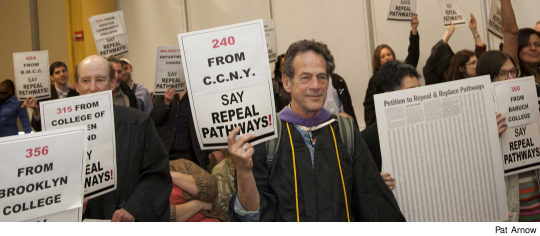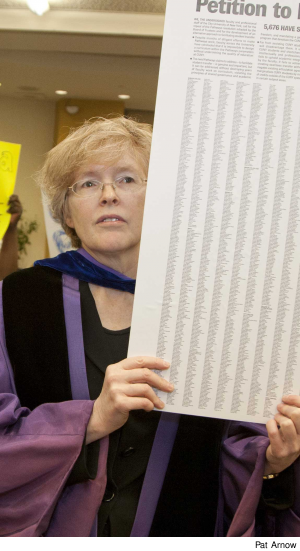 |
“Nearly 6,000 have spoken, Pathways is broken!” That was the message PSC members brought to the CUNY Board of Trustees after delivering petitions signed by 5,676 faculty, staff and retirees. The thousands of signers urged the trustees to repeal and replace the “Pathways initiative,” CUNY’s controversial overhaul of general education and transfer.
Signers of the statement included 75 of CUNY’s 131 Distinguished Professors and a majority of the University’s department chairs. Half the members of the administration-appointed Pathways Common Course Review Committee signed as well, calling for an end to a process in which they have been actively involved.
As the text of the petition says, “Despite months of diligent efforts to make Pathways work, faculty across the University have concluded that it is impossible to design a curriculum within the Pathways parameters without undermining the quality of education at CUNY.”
ADDING UP ACTIVISM
PSC members opposed to Pathways made up three-quarters of the audience at the trustees’ April 30 meeting. With many wearing academic robes, they carried signs about the strong support for the petition throughout CUNY. One sign said, “464 from BMCC Say Repeal Pathways,” with similar declarations from other colleges and constituencies: “446 from Queens College,” “3,166 Current Full-Time Faculty,” “Majority of Department Chairs,” or simply stating the grand total,“5,676 Say Repeal Pathways.” Other union members carried posters with the text of the petition and (in very small type) the full list of names of those who had signed.
“It’s important to make the petition palpable so that it can’t be ignored,” said James Davis, an associate professor of English at Brooklyn College where 356 faculty and staff had signed. “It’s an opportunity to make a statement.”
2/5 TOO SHORT
“CUNY students deserve more than 3/5 of a science course,” said a sign held by Saavik Ford, associate professor of astronomy at BMCC. Under Pathways, she explained, no general education course can require more than three hours per week – compared to the five hours a week, including two hours of laboratory experiments, that is currently the norm in her introductory science classes. “Do you want your nurses, doctors and respiratory therapists to have less practice per week?” Ford asked in a letter that was published in the New York Post.
 |
“Among the signers are sculptors, scientists, mathematicians, novelists, historians, philosophers, anthropologists and others,” PSC President Barbara Bowen wrote in an accompanying letter to the trustees. “Every name on the petition you have received has been checked for accuracy, primarily using CUNY’s own personnel data,” she noted. “Opposition on this level to a Board academic policy has not been seen in a generation.”
PSC First Vice President Steve London told the May PSC Delegate Assembly that the organizing around the petition had shifted the terms of debate. “The petition made it clear that CUNY’s attempt to marginalize critics of Pathways has failed,” said London. “Remember, it was only a few months ago that CUNY was trying to say that Pathways had firm support from CUNY faculty, that it was only a few who were discontented. We no longer hear those claims.”
RESOUNDING RESOLUTIONS
In addition to the petition, CUNY faculty have voiced their opposition to Pathways through a growing number of resolutions adopted by college senates and discipline councils, the latter made up of CUNY’s elected department chairs within a given field. In April, new statements against Pathways came from the Brooklyn College Faculty Council, City College’s CLAS Faculty Council, City Tech’s College Council, John Jay’s Faculty Senate and the College Senate at York. Faculty governance bodies at 12 of CUNY’s 17 undergraduate colleges have now adopted resolutions rejecting Pathways. And in a resolution adopted in early May, the Council of Faculty Governance Leaders, representatives of faculty senates across the University, declared that it “recommends that the Pathways program be scrapped.” The statement was signed by faculty representatives from all but one of CUNY’s undergraduate schools.
“It makes no sense to press forward on such a major change in curriculum when so many faculty are strongly opposed,” Bowen told Clarion. “Pathways is a plan for education on the cheap and CUNY students deserve better. They need a plan that will address transfer problems without diluting their education.”
CUNY discipline councils have also spoken out, most recently in psychology and English. In a resolution adopted in mid-April, the Psychology Discipline Council said that it “calls on the Board of Trustees and the Chancellor to terminate the Pathways initiative” so that faculty across CUNY can “formulate a more reasonable and effective plan to ease student transfer within the University.”
Later that month, the English Discipline Council urged the trustees to abandon the Pathways plan, which the council argued will not in fact help students. In an April 27 letter, the council noted that most composition courses at CUNY meet for four hours per week and earn three credits, a system that it called “both a current and a best practice” that is vital to student success, thanks to the one-on-one assistance that it makes possible. Yet a directive from CUNY central administration in February stated that under Pathways, “all courses in the Common Core must be three credits and three hours.” Limited exceptions were to be allowed, but only for some science classes and some classes in associate’s degree programs.
“When the council made its case for a universal fourth contact hour for composition courses to Executive Vice Chancellor [Alexandra] Logue, she said the Pathways initiative ‘does not limit [campuses] from scheduling such an hour,’” the English Discipline Council reported, citing correspondence in March. “Yet Chief Academic Officers (CAOs) at several colleges have overturned their college committees’ approval of four-contact-hour composition classes and submitted proposals to the CUNY-wide Composition Course Approval Committee with only three contact hours.”
The English Discipline Council expressed deep concern about this outcome, in terms of both education and the fate of shared governance: “The failure of CAOs to follow the practice of faculty governance in these curricular matters, not only exacerbates the problem[s] of Pathways…but also proves that transferability is not the real issue.”
Critics of Pathways have emphasized that they want more than a halt to Pathways – they want to be involved in developing an alternative. As the petition states, “The need Pathways claims to address – to facilitate student transfer – is genuine and important, but it can be addressed without destroying years of faculty work on curriculum, violating the principles of shared governance and academic freedom, and mandating a general education program that devalues the CUNY degree.”
ALTERNATIVES
Faculty statements in opposition to Pathways have sometimes suggested other approaches to easing student transfer within CUNY, possible alternatives to the Procrustean bed of Pathways and its sharply reduced limits on general education credits. Often these ideas are labor-intensive, but proponents argue that they would provide more effective solutions. The QCC Academic Senate, for example, urged CUNY to “assist the colleges of CUNY to establish more dual-joint degree programs, enhanced articulation agreements and website assistance with transfer advisement….”
On May 16, a joint statement from University Faculty Senate Chair Sandi Cooper and PSC President Bowen went a step further. “The UFS, supported by the PSC, has begun a major effort to develop an alternative to Pathways,” it announced. By the end of the Fall 2012 semester, the result will be a new plan “for facilitating student transfer while upholding the quality of a CUNY degree.”
ELECTED
“The UFS will bring together college faculty governance bodies, department chairs, discipline councils and other elected representatives to develop a proposal with academic integrity for facilitating student transfer,” while the PSC provides organizing support. Involvement of other CUNY faculty “who have developed special knowledge of the issue during the past year of discussions” will also be sought.
“Our discussion will also include the question of additional resources for CUNY,” Cooper and Bowen added. “We believe that a meaningful solution to the student transfer problem will require more funding, not less.”
“There are genuine problems in CUNY’s current transfer policies and practices, and we are committed to solving them,” the two leaders wrote. “We are confident that the elected faculty representatives can produce an approach to student transfer that strengthens, rather than weakens, this great university.”
Student opposition to Pathways has grown this semester. On May 9, BMCC’s Student Government Association declared that it “strongly opposes, does not support, and furthermore has no confidence in the CUNY Pathways Program.” Noting that CUNY has emphasized endorsements of Pathways “by non-CUNY executives and private college presidents who do not have any idea how the CUNY system operates,” the student resolution expressed concern that Pathways would lead to cutbacks in lab time in science classes and a “low-quality curriculum” overall.
The student government at College of Staten Island also concluded last fall that Pathways “limits the knowledge and skill level expected of students and does not reflect the high standards for education which the institutions of CUNY strive to provide.”
Brandon Clarke, vice president of the student government at LaGuardia Community College, attended the April 30 meeting of the Board of Trustees holding a sign that called Pathways “a step in the right direction.” But he acknowledged that students were divided on its merits. “I can appreciate the concerns that faculty have expressed, and the concerns of students who support them,” Clarke told Clarion. “If there are elements of Pathways that devalue a CUNY degree, then it’s appropriate for Pathways to be reworked. But I don’t want to throw the baby out with the bathwater – if Pathways doesn’t go forward, then today’s students will be left in a worse situation.”
Students opposed to Pathways are considering a lawsuit against it; meanwhile the suit jointly filed by the PSC and the UFS is proceeding in court. The union has also filed a grievance against Pathways, charging that it violates provisions of the contract that require adherence to CUNY’s Bylaws.
“We have also filed a number of FOIL [Freedom of Information Law] requests,” London told the Delegate Assembly in May. “For example, we want to find out how much money they have spent on their propaganda campaign in support of Pathways.”
CUNY’s slick public relations effort has drawn faculty attention, but not necessarily in a positive way. In an April 30 resolution, CCNY’s Faculty Senate urged 80th Street “to avoid any future extravagances” similar to the “glossy Pathways brochure presenting its own view…that was undoubtedly expensive to produce.”
The PSC is encouraging members to speak out at the next public hearing of Board of Trustees to be held at Hostos Community College on June 18. Speakers have only three minutes and must sign up in advance; if you are interested, contact Fran Clark at [email protected]
PATHWAYS WATCH
To stay informed about Pathways and the resistance to it, sign up to receive “Pathways Watch,” a regular update by e-mail that the PSC launched this Spring. (Sign up at tinyurl.com/PathwaysWatch.) Opposition to Pathways has grown rapidly this semester and that trend is likely to continue in the Fall.
“We’re taking the long view,” London told union delegates. “This is going to be a continuing struggle. It won’t be over quickly, but we think we’re going to win.”
______________________________
RELATED COVERAGE
What Is Pathways?
A Taste of Language and Culture
Pathways Under Fire: Calls for a Halt Are Growing
March 8 Town Hall Meeting on Pathways Draws Hundreds

